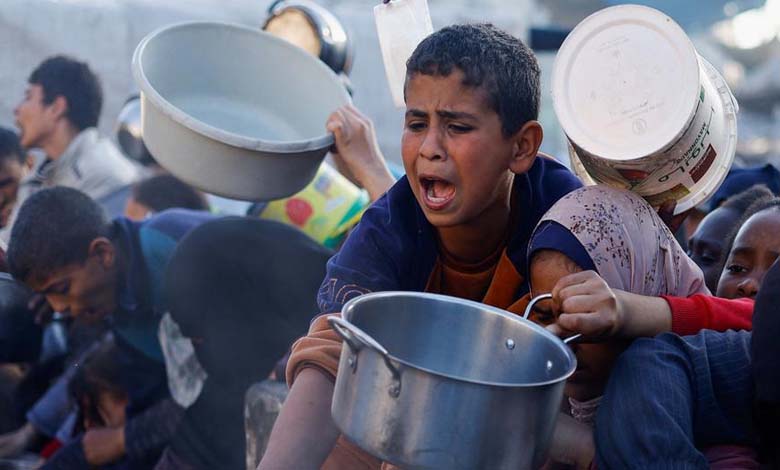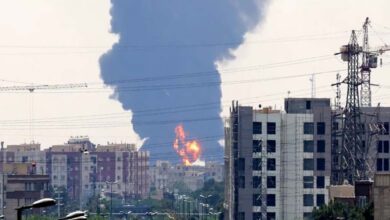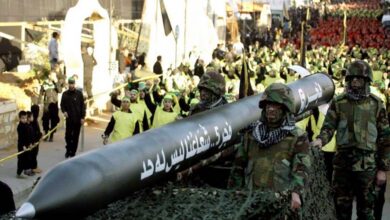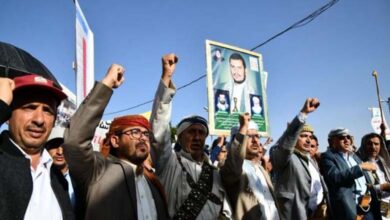UN Warns of Famine in Northern Gaza
Israel Rejects UN Report on Gaza Famine, Calls it Biased

A UN-supported report issued on Saturday warned of an impending famine threat in northern Gaza due to escalating bombings, ongoing clashes, and a near total halt in food aid. Israel dismissed the report, labeling it biased.
-
Under a Tight Siege, Israel Expands Its Attack in Northern Gaza amid Reports of Hamas Activity
-
“The Forest of Noise”: When Painful Memories Tell the Ruins of Gaza
The Famine Review Committee warned that “the likelihood of famine is imminent and significant due to the rapid deterioration of conditions in Gaza.” The report noted that “famine thresholds may have already been crossed or will be soon.”
The committee projects that by April 2025, approximately 345,000 people in Gaza, or 16% of the population, will experience “catastrophic” food insecurity. This level, classified as Phase 5 by the IPC (Integrated Food Security Phase Classification), indicates visible famine, death, destitution, and severe acute malnutrition.
-
Image from Gaza: The “Bare Bodies” Weapon Distresses Northern Residents
-
UN Fears the Gaza and Lebanon Wars Spreading to Syria
Since the committee’s report dated October 17, conditions in northern Gaza have worsened, with the collapse of food systems, reduced humanitarian aid, and worsening water, sanitation, and hygiene conditions.
The report concludes that “famine, malnutrition, and excess deaths due to malnutrition and disease are rapidly escalating in these areas.”
Since October 6, the Israeli army has conducted aerial and ground offensives in northern Gaza, targeting areas like Jabalia, Beit Lahia, and Beit Hanoun, to prevent Hamas fighters from regrouping.
-
Latest News from Gaza Now… Humanitarian Catastrophe and UN Cries in the North
-
No Ceasefire in Gaza until De-escalation between Iran and Israel
According to the report, aid shipments allowed into Gaza are at their lowest since October 2023, with essential items’ prices skyrocketing on the black market. Cooking gas, diesel, and wood prices have surged by 2,612%, 1,315%, and 250%, respectively.
Amidst these soaring prices, the report highlights that livelihoods have collapsed, making it nearly impossible to purchase or barter for food and essential needs.
The committee also expressed concern over Israel’s decision last month to cut ties with UNRWA, warning of “severe consequences for humanitarian operations.”
-
Washington hopes to end the Gaza war following Sinwar’s death
-
Bodies devoured by stray dogs: “Tragedy” in northern Gaza described by Jabalia
The Israeli army, however, dismissed the report’s findings, stating that “unfortunately, researchers continue to rely on partial and biased data from sources with vested interests.”
The army added that it had reinforced aid efforts, including opening an additional crossing on Friday. It noted that 39,000 trucks carrying more than 840,000 tons of food have entered Gaza in the past two months, with daily meetings held with the UN, which has 700 aid trucks ready for distribution.
On the ground, two separate Israeli strikes killed at least 13 people, including women and children, on Saturday in Gaza, according to Palestinian health officials, while Israel announced its first aid delivery to northern Gaza in weeks.
-
Number of Deaths in Gaza So Far: A Shocking Toll of the War
-
The “Buried” Nightmare in Gaza: A “Tip of the Iceberg” Awaiting the End of the War
One strike hit a school turned shelter in the Al-Tuffah neighborhood in Gaza City, killing at least six people, including local journalists, a pregnant woman, and a child, according to Gaza’s Health Ministry. The Israeli army claimed it targeted a member of the Palestinian Islamic Jihad, without providing further evidence.
The second strike killed seven people in a tent in Khan Younis city, where displaced persons sought refuge. Nasser Hospital reported that the dead included two women and a child. The Israeli army did not immediately respond to requests for comment.
-
Disengagement from Gaza: Did Hezbollah accept in private what it publicly rejected?
-
In Memory of the “Flood”: The War in Gaza Returns to Its Initial State
Some critics denounce the use of starvation tactics in northern Gaza, prompting the United States, Israel’s main ally, to set a deadline in the coming days to improve the humanitarian situation or face potential restrictions on military cooperation.
Human rights organizations consider blocking humanitarian aid as a war crime, a crime against humanity, and a violation of international law. Reports have suggested that Israel is using starvation as a tactic in its war against Hamas, pointing to plans by Israeli generals to pressure the movement through deprivation.












